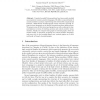Free Online Productivity Tools
i2Speak
i2Symbol
i2OCR
iTex2Img
iWeb2Print
iWeb2Shot
i2Type
iPdf2Split
iPdf2Merge
i2Bopomofo
i2Arabic
i2Style
i2Image
i2PDF
iLatex2Rtf
Sci2ools
125
click to vote
ACTA
2006
2006
Linearly bounded infinite graphs
Linearly bounded Turing machines have been mainly studied as acceptors for context-sensitive languages. We define a natural family of canonical infinite automata representing their observable computational behavior, called linearly bounded graphs. These automata naturally accept the same languages as the linearly bounded machines defining them. We present some of their structural properties as well as alternative characterizations in terms of rewriting systems and context-sensitive transductions. Finally, we compare these graphs to rational graphs, which are another family of automata accepting the context-sensitive languages, and prove that in the bounded-degree case, rational graphs are a strict sub-family of linearly bounded graphs.
Related Content
| Added | 10 Dec 2010 |
| Updated | 10 Dec 2010 |
| Type | Journal |
| Year | 2006 |
| Where | ACTA |
| Authors | Arnaud Carayol, Antoine Meyer |
Comments (0)

